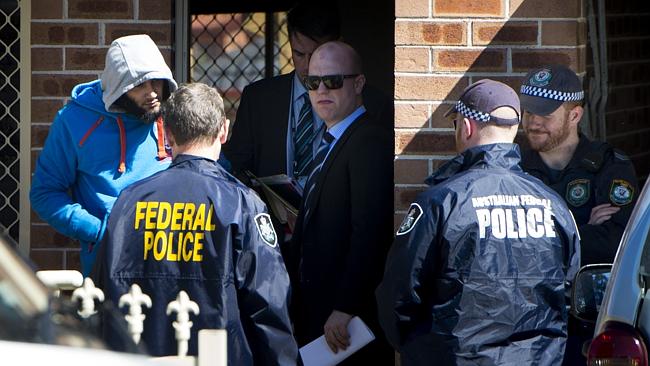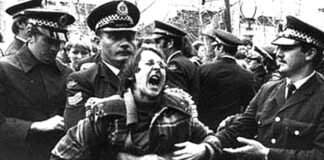The government is using hysteria about terrorism to deliver a major boost to ASIO and police powers. It has devised an enormous number of new and modified anti-terror laws that make it easier to conduct surveillance and charge people with terrorism-related offences.
Independent MP Andrew Wilkie, a former intelligence officer, denounced the laws as taking Australia in the direction of a “police state”, saying,
“I can only assume the government is wanting to capitalise on and exploit the current security environment…It is clearly overreach by the security services who have basically been invited to write an open cheque.”
The first set of changes has already passed through parliament. ASIO already operates in secret. Now the media will be banned from reporting any corruption, abuse of its powers or mistakes in targeting individuals.
Reporting or communicating any intelligence-related information will put journalists or whistleblowers at risk of a ten-year jail sentence.
ASIO officers have also been granted immunity from any crimes committed while involved in “special intelligence operations” for everything except the most serious offences: causing death, serious injury, serious loss of property or committing a sexual offence. Any operation can be declared “special” by the Attorney-General, currently George Brandis.
At the last minute the government amended the law to ensure ASIO did not have legal sanction to commit torture. But as the Australian Lawyers Alliance’s Greg Barns said, “There is nothing stopping ASIO keeping a person in solitary confinement for weeks on end, making threats against them, or threatening to harm them or members of their families.”
The agency has also been given wider search powers over postal and delivery services, and the ability to access an unlimited number of computers on a network using just one warrant, with the ability to copy, delete or modify anything on any of the computers. The wording of the legislation is so broad many legal experts say it could be used to monitor the entire internet.
To top it off ASIO has been handed an extra $200 million in funding. Its budget has already increased by 417 per cent since 2001.
The Muslim community will bear the brunt of this new expansion of its powers, as the authorities step up their day-to-day harassment and surveillance. Such treatment is routine. In 2012 Islamic leaders were forced to protest to ASIO about harassment of young Muslim men at Melbourne’s Preston mosque. One told The Sunday Age that he was interviewed by 15 ASIO agents before a judge, and told if he refused to answer questions or told anyone about it he would go to jail for five years.
Abuse of powers
ASIO has shown it cannot be trusted. It has a long history of abuse of its powers. In 2007 a court threw out evidence tendered by ASIO against medical student Izhar ul-Haque, with the judge accusing ASIO officers of kidnapping and false imprisonment. In 2004 it paid out $200,000 after mistakenly labeling a Kuwaiti asylum seeker a security risk, causing him to be held in detention for two years. Bilal Daye won an out of court settlement after ASIO mistakenly raided his house in 2001, holding him and his wife at gunpoint for an hour before discovering they were at the wrong address.
ASIO’s role in the 1978 Hilton Hotel bombing, which killed three people, remains unexplained. ASIO was accused of helping other security agencies to plant the bomb. Tim Anderson, a member of the group Ananda Marga, was framed by police for the bombing and served jail time before he was later cleared. The NSW and federal governments avoided requests for an inquiry.
As recently as 2005 it deported anti-war activist Scott Parkin, labeling him a “threat to national security” for nothing more than advocating non-violent protest against war profiteer Halliburton.
Negative ASIO security assessments also underpin the indefinite detention of almost 50 refugees. Under existing laws, the reasons for their negative assessment are kept secret and are unable to be challenged in court. Since the Labor government established a limited review of the ASIO findings in 2012, the security agency has reversed at least eight of its own assessments.
Further changes
Two further sets of anti-terror laws are still to go through parliament. One would require telecommunications companies to retain metadata for two years to allow ASIO to access it.
The other contains a raft of changes including an extension of the controversial preventative detention and control order regimes introduced in 2005 for a further ten years. The situations where control orders can be used would also expand.
Preventative detention allows suspects to be held for 14 days without charge where a terrorist attack is judged imminent. It was used for the first time ever during the recent terror raids in Sydney. But the measures have been branded “worse than useless” by Bret Walker, a Sydney barrister and former national security monitor.
Anyone travelling overseas to certain “designated areas” would be deemed guilty of engaging in terrorism, and forced to prove in court they have a legitimate reason for travelling there.
It will also be easier to arrest someone for a terrorism offence, lowering the threshold so that it is “inevitable” innocent people will be arrested, according to the Australian Lawyers Alliance.
A new “advocating terrorism” offence contains a wide and vaguely worded prohibition on anything that “encourages” a terrorist act. University of Sydney professor of law Ben Saul says it is, “unclear what kinds of speech would fall within the definition of the offence”. This could feasibly include anything that encourages opposition to Western imperialist intervention in the Middle East, by denouncing the death and destruction inflicted at the hands of the West.
The same test will now allow an organisation to be banned as a terrorist group.
Abbott wants to let the security agencies even further off the leash. This is a threat to all of our rights.






